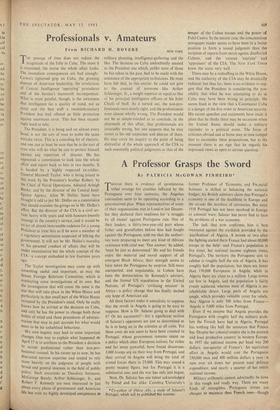Professionals v. Amateurs
From RICHARD H. ROVERE
NEW YORK
THE passage of time does not reduce the magnitude of the folly in Cuba. The more it is examined, the worse the whole affair looks.
The immediate consequences are bad enough: Castro's tightened grip on Cuba, the growing distrust of American leadership, the revelations of Central Intelligence 'operating' procedures and of the bureau's mammoth incompetence. What is more painful, though, is the awareness that intelligence (as a quality of mind, not as data) and the best staff a twentieth-century President has had offered so little protection against enormous error. This has been exceed- ingly hard to take.
The President, it is being said on almost every hand, is not the sort of man to make the same mistake twice. This is a consoling bit of rhetoric, and one can at least be sure that he is the sort of man who will do what he can to protect himself against any repetition of disaster. He has appointed a commission to look into the whole affair and report back to him in two months. It is headed by a highly respected ex-soldier, General Maxwell Taylor, who is being joined in this work by the President's brother Robert; by the Chief of Naval Operations. Admiral Arleigh Burke; and by the director of the Central Intel- ligence Agency, Allen W. Dulles. Some have thought it odd to put Mr. Dulles on a commission that should examine the goings-on in Mr. Dulles's office. But the director of the CIA is a civil ser- vant heavy with years and with honours (mostly unsung) in the country's service, and it would be an act of almost inexcusable rudeness for a young President to treat him as if he were a member of a regulatory commission suspected of bilking the government. It will not be Mr. Dulles's morality or his personal conduct of affairs that will be under examination but the whole concept of the CIA—a concept embodied in law fourteen years ago.
The Taylor investigation may come up with something useful and important, as may the Senate Foreign Relations Committee, which is conducting some investigations of its own. But the investigation that will count the most is the one that will take place in the White House and particularly in that small part of the White House Occupied by the President's mind. Only he really knows how he arrived at the decision on Cuba, and only he has the power to change both those habits of mind and those procedures of adminis- tration that may in part account for what would seem to be his unhabitual behaviour.
His own inquiry may lead to some important changes. One way to explain what happened en April 17 is to attribute to the President a decision to accept professional rather than non-pro- fessional counsel. In his career up to now, he has distrusted narrow expertise and tended to rely more heavily on the judgment of people with broad and general interests in the field of public policy. Such associates as Theodore Sorenson, McGeorge Bundy, Arthur Schlesinger, Jr., and Robert F. Kennedy are men interested in just about every phase of government and American life but with no highly developed competence in military planning, intelligence-gathering and the like. The decision on Cuba undoubtedly seemed to the President one which, unlike most of those he has taken in the past, had to be made with the assistance of the appropriate technicians. He must have felt that, in this matter, he could not give to the counsel of someone like Arthur Schlesinger, Jr., a weight superior or equal to that of his principal intelligence officers or his Joint Chiefs of Staff. As it turned out, the non-pro- fessionals were mostly right, and the professionals were almost wholly wrong. The President would not be so simple-minded as to conclude, in the aftermath of this affair, that professionals are invariably wrong, but one suspects that he may revert to his old scepticism and distrust of them. He may carry his inquiry to the point of being distrustful of the whole approach of the CIA to such essentially political judgments as that of the temper of the Cuban masses and the power of Fidel Castro. In the instant case, the conscientious newspaper reader seems to have been in a better position to form a sound judgment than the recipient of reports from secret agents, disaffected Cubans, and the veteran 'analysts' and 'appraisers' of the CIA. The New York Tinier knew the score very well.
There may be a reshuffling in the White House, and the authority of the CIA may be drastically reduced; but thus far, there is no evidence to sug- gest that the President is considering the pos- sibility that what he was attempting to do in Cuba may have been wrong in principle. He seems fixed in the view that a Communist Cuba is a danger of the first order to American security. His recent speeches and statements have made it plain that he thinks there may be occasions when the United States should make a military rejoinder to a political event. The force of criticism abroad and at home may in time compel him to reconsider these propositions, but at the moment there is no sign that he regards his expressed views as open to serious question.






































 Previous page
Previous page